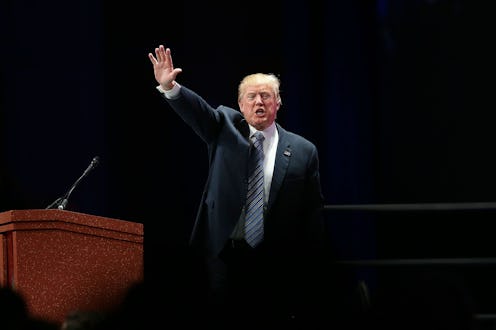Over the summer, it seemed like Donald Trump was a complete joke — and to many people, he still is. But here's the problem: His increasingly xenophobic comments are lending validity to white nationalists and white supremacists in an extremely public way. Trump is normalizing hateful rhetoric, with the latest example being his remarks Thursday night in which Trump said he would "absolutely" require all Muslims to "register" in a database. Subsequently, as Trip Gabriel reported for The New York Times, Trump didn't even try to deny the direct similarity between his proposed policy and the condition of Jews in Nazi Germany.
Asked later, as he signed autographs, how such a database would be different from Jews having to register in Nazi Germany, Mr. Trump repeatedly said, “You tell me,” until he stopped responding to the question.
The fact that Trump can freely spew this kind of rhetoric while facing minimal consequences is appalling. But we unfortunately can't ignore that people like him, the Westboro Baptist Church, and the Ku Klux Klan still retain a significant degree of notoriety and, in some cases, even influence. It appears to be common practice to insist that what happened in Nazi Germany could never happen here, but that will only hold true if people are actively speaking out against injustice. Silence can often be used a tool to ensure and perpetuate oppression, so even if Trump's comments seem laughable, it is necessary to explicitly and publicly stand against them.
But here's the second thing: It should be obvious by now that genocide and systemic oppression are not only unacceptable but also worthy of swift condemnation. However, if it were obvious, then discussions like this would not still be necessary. Genocide has happened all over the world, it continues to this day, and yet even now, we're obligated to cite examples as though it is not evident that this systemic isolation and extermination of a group of people should be nipped in the bud.
Nevertheless, as it stands, making this connection between Trump's comments and Nazi Germany-era policies is critical. When we make these connections, we are making active attempts to learn from history — though in this context, that is a gross understatement. Trump's xenophobia stopped being a joke quite awhile ago, when it became evident that he would remain one of the Republican front-runners for some time to come. Ben Carson may have caught up to him, but Trump isn't finished, and his increasingly sensational comments continue to lend both visibility and credence to those who have long held such despicable beliefs.
The truth of the matter is that many people in the U.S. and elsewhere have held extreme views like this before Trump and they will continue to do so long after he fades into obscurity unless we do something about it.
We cannot stay silent. Both Islamophobia and anti-Semitism are running rampant throughout the world. It is not enough to say "never again for anyone" or "never forget" unless we actually mean that, and dismissing hate speech like Trump's as a joke erases the real harm that it causes. Our mere insistence that something like the Holocaust could never happen here is not sufficient. For that insistence to really mean something, we need to stand up to Islamophobia, to anti-Semitism, to racism, to xenophobia, to anti-immigrant sentiment — to any and all forms of systemic oppression and violence.
